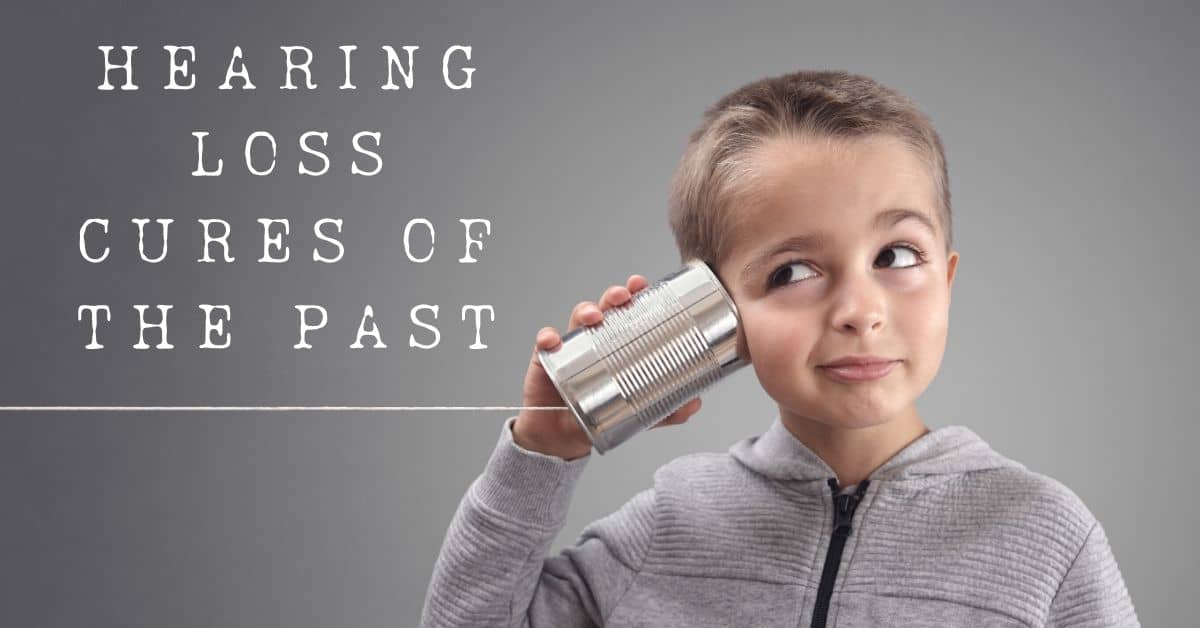
- How to Properly Clean Your Hearing Aids - April 15, 2024
- How to Handle Ear Infections With Hearing Aids - April 5, 2024
- Strategies for Working Professionals with Hearing Loss - March 27, 2024
Have you ever wondered how people thought about hearing loss in the past? Today we know that hearing loss can’t be cured, and the best treatment options are with cochlear implants or hearing aids that can help you hear clearly, even in complex listening environments. Here’s a look back at some of the comical, and at times frightening, hearing loss “cures” of the past.
Using Tools
Hearing loss has been a problem for thousands of years, and people have developed creative ways to treat or “cure” hearing loss. In the 1800s, people designed tools that could cure hearing loss. One such device was a large vibrating tool that was used to stimulate the inner ear. Needless to say, this tool was uncomfortable, and didn’t do anything to diminish hearing loss.
Another tool from the last 1800s that could supposedly cure hearing loss was an artificial eardrum. This small metal contraption was inserted into the ear canal, with the intention of helping sounds reach the inner ear. However, these devices were extremely painful to insert into the ear, and they were completely ineffective in treating hearing loss.
Other tools would send an electrical current through the ear, hoping to stimulate the cells in the ear. This was called galvanism, and while it had no effect on hearing, it could damage the ear.
Liquid Solutions
Throughout the centuries, doctors have used liquid solutions to mitigate hearing loss, and all manner of things have been poured into ears in an attempt to cure hearing loss. Beethoven, the famous composer who lost his hearing in his early 30s, was prescribed a treatment of almond oil.
Among the hearing loss cures of the past was one involving plaster. A liquid plaster would be poured into the ears and left to harden. When the plaster dried it would cause painful blistering in the ear canal. When the blisters broke and pus would drain from the ear, doctors took it as a sign that the toxins were draining from the ear, and they thought hearing would be restored.
20th Century Solutions
Doctors and scientists continued to experiment with cures for hearing loss throughout the 20th century. One modern cure for hearing loss is hypnosis, and some people have claimed their hearing loss was cured during hypnosis sessions. Some hypnotherapists still claim that hypnosis can cure hearing loss and tinnitus.
Have you heard of the hearing loss pill? You can still buy this pill today, and the pill’s developers claim it can cure hearing loss. The pill, containing a mix of vitamins and minerals that promote cellular health, won’t hurt you, but these pills certainly can’t cure hearing loss.
Another popular solution for hearing loss is a personal sound amplification device, which makes all the sounds around you louder, helping you hear. These personal amplifiers will help you hear in some circumstances, but they can lead to more hearing loss through over amplification. They will often amplify noise to a painful level, and the sound quality doesn’t provide clarity. The best treatment option for hearing loss is a pair of quality hearing aids that will only amplify the sounds you’re struggling to hear.
Overcoming Hearing Loss
Hearing loss is caused by damage to the cells in the middle or inner ear. This can be caused by a head injury, like a concussion, or an illness such as an ear infection. Hearing loss can also be caused by exposure to noise, or as the cells in the ear wear down during aging. Once these cells have been damaged, they don’t regenerate, and hearing loss becomes permanent.
Today’s hearing aids are sophisticated mini computers that are capable of analyzing the sound environment, amplifying soft sounds, and helping you focus on what you want to hear. With background noise reduction it’s easier to hear clearly, and you don’t have to turn the volume up to unsafe levels.
Hearing loss cures of the past are a great lesson in what not to do, and even some modern solutions aren’t based on facts. If you have hearing loss or tinnitus, visit a hearing health specialist for a hearing test, and determine the type and severity of your hearing loss. Then find the hearing devices that will help you hear clearly in every situation.
